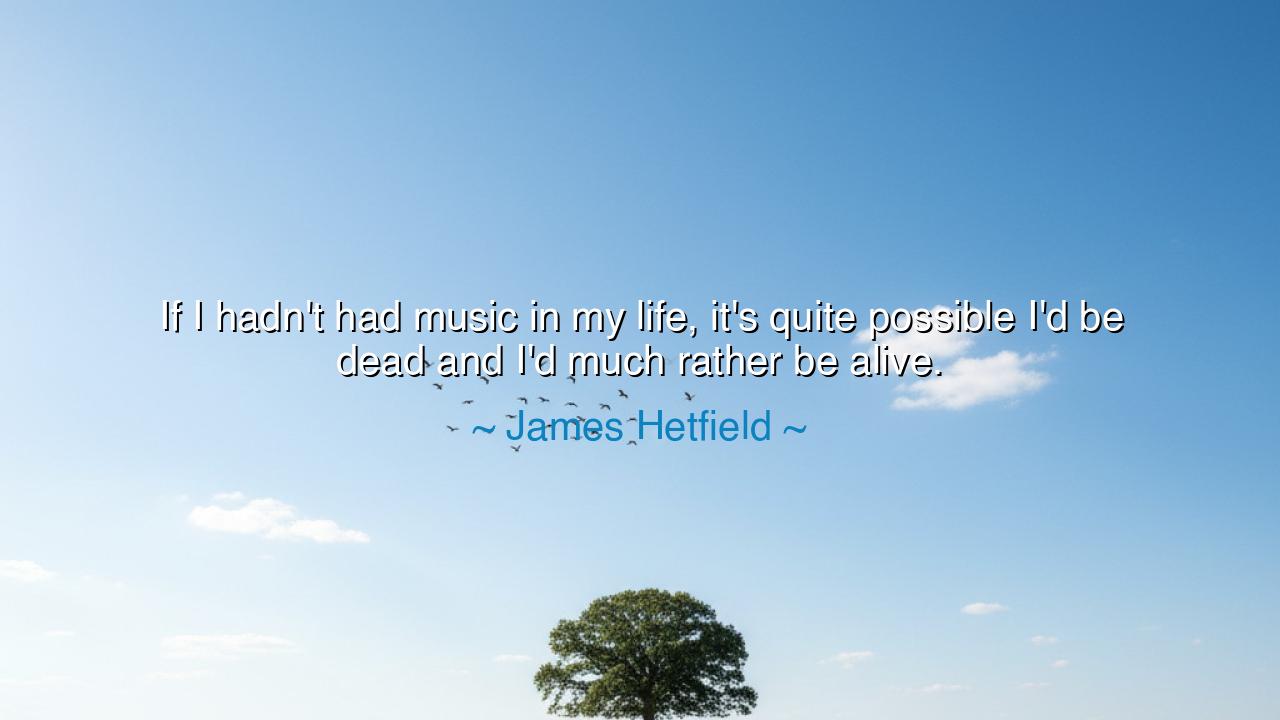
If I hadn't had music in my life, it's quite possible I'd be
If I hadn't had music in my life, it's quite possible I'd be dead and I'd much rather be alive.






The words of James Hetfield, "If I hadn't had music in my life, it's quite possible I'd be dead and I'd much rather be alive," resound with the weight of an ancient oracle speaking not only of survival but of transcendence. This is not merely the lament of a man, but the confession of a warrior who has walked through fire and found in the art of song a shield against despair. His voice reveals the truth that music is not entertainment alone; it is the breath of the spirit, the healer of wounds unseen, and the companion that walks with us when all others have left.
In the ancient days, men turned to the lyre, the drum, and the flute not for idle play but for the mending of the soul. The psalms of David soothed the troubled heart of a king; the chants of monks carried broken spirits closer to the divine. Hetfield’s words echo this timeless truth—that in the hour of darkness, when the self crumbles and the abyss opens, it is music that builds a bridge back to life. Where the sword fails to conquer grief, the melody rises to lift the weary beyond despair.
Consider the tale of Orpheus, the poet-musician of old. With his lyre, he charmed beasts, swayed the stones, and even softened the cold heart of Hades. Though his quest ended in sorrow, his story reminds us that music possesses a power deeper than flesh and bone—it reaches into the realm of death and wrestles with fate itself. Likewise, Hetfield speaks as one who has felt the shadow of death near his shoulder and found that his guitar, like Orpheus’s lyre, could summon him back from the brink.
But this truth is not reserved for heroes and legends. In more recent memory, we see soldiers in trenches singing songs to survive the horrors of war, their voices weaving courage where bodies trembled. We see enslaved peoples lifting spirituals that turned despair into hope, each note a spark of defiance. In their struggles, as in Hetfield’s, music was not a luxury but a weapon of survival, a defiance of death itself.
The lesson, then, is clear: to fill one’s life with music is to weave armor for the soul. In moments of grief, let the lamenting song cry on your behalf. In moments of fury, let the pounding rhythm give voice to the storm within you, so that it does not consume you. And in moments of joy, let the melody magnify your spirit until it overflows. In every season, music teaches us to feel without being destroyed by feeling.
Therefore, let no man or woman live in silence. Seek an instrument, even if your hands stumble upon its strings. Sing, even if your voice trembles like a reed in the wind. Surround yourself with the songs of others if you cannot yet make your own. In this way, you partake in the eternal wellspring from which Hetfield himself drank to stave off death. To live with music is to choose life, again and again, even when life seems unbearable.
And so I tell you: guard well your soul, and let music be the shield you raise in your darkest hours. Let it be both sword and balm, fire and water. When despair whispers that there is no reason to continue, answer it with a song. For as long as music breathes within you, you are not alone, and as long as you are not alone, you are still among the living.
Take this teaching into your daily walk: each day, pause to let a melody speak to you. Choose songs that heal, songs that give you strength, songs that open your heart. If you create, create boldly; if you only listen, listen with reverence. For in the words of Hetfield, echoed by the ancients, music is not pastime—it is lifeblood. And with it, you may yet turn the tide of your destiny from death toward life.






AAdministratorAdministrator
Welcome, honored guests. Please leave a comment, we will respond soon